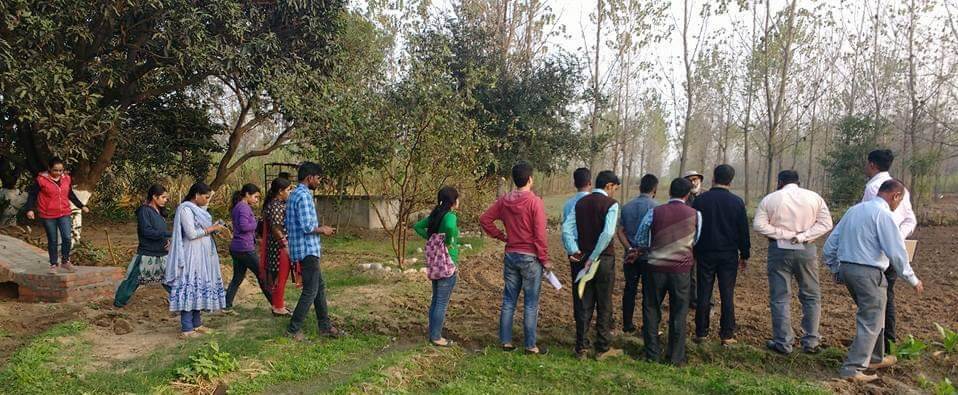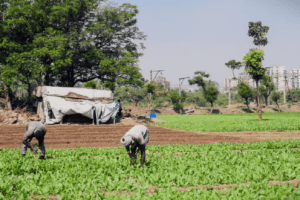Mahesh Chander has been writing about youth on various platforms, including AESA, over the years. Here, he shares his thoughts on the importance of Green Skills for youth, it being the theme of this year’s International Youth Day.
CONTEXT
Currently, there are 1.2 billion young people aged 15 to 24 years, accounting for 16 per cent of the global population. By 2030 – the target date for the Sustainable Development Goals (SDGs) that make up the 2030 Agenda – the number of youth is projected to have grown by 7 per cent, to nearly 1.3 billion. Youth can be a positive force for development when provided with the knowledge and opportunities they need to thrive. Therefore, efforts are needed to make youth a productive workforce who can contribute towards making the world a better place for all.
On August 12 every year the United Nations (UN) celebrates International Youth Day to recognize efforts of the world’s youth in enhancing sustainable living. It also aims to promote all the many ways to engage them in becoming more actively involved in making positive contributions to their communities. Each year, a well-thought-out demand-driven theme is announced, well in advance, to celebrate the day with a commitment to make a difference through youths. This year’s theme is Green Skills for Youth: Towards a Sustainable World. If we look around, we see the world is slowly transitioning to a greener world – an environmentally sustainable and climate-friendly world. A successful transition towards a greener world will depend on the development of green skills in the population. While green skills are relevant for people of all ages, they have greater importance for younger people as they can contribute to the green transition for a longer period. Youths play a crucial role in shaping the future, and their preparedness to embrace green skills is vital for creating a sustainable world.
WHAT ARE GREEN SKILLS?
Green skills are ‘knowledge, abilities, values and attitudes needed to live in, develop and support a sustainable and resource-efficient society.’ These include technical knowledge and skills that enable effective use of green technologies and processes in occupational settings, as well as transversal skills that draw on a range of knowledge, values and attitudes to facilitate environmentally sustainable decisions in work and in life. Green skills in the agricultural sector focus on sustainable farming practices, organic agriculture, permaculture, agroforestry, and efficient resource management, etc. Professionals with these skills help promote sustainable food production, biodiversity conservation, and responsible land use. Also, green skills enable communities and industries to adapt to the challenges posed by climate change and other environmental threats, enhancing their resilience and long-term viability.

Green skills contribute to preserving or restoring environmental quality for a sustainable future and include jobs that protect ecosystems and biodiversity, reduce energy, and minimize waste and pollution. These skills are vital for environmental protection, renewable energy – for example, solar and wind energy – sustainable agriculture, waste management, and other areas that support sustainable development. Green skills are also instrumental in promoting circular economic models that minimize waste generation, maximize resource efficiency, and reduce strain on natural ecosystems. Due to their interdisciplinary nature, the essence of green skills is sometimes expressed, partly if not wholly, through other associated terms such as ‘skills for the future’ and ‘skills for green jobs’. As societies transition toward sustainable practices, there is a growing demand for green jobs. Developing green skills can lead to increased employment opportunities and foster economic growth in environmentally friendly sectors. In the agricultural sector, Green Skills mostly centre around water conservation practices, non-chemical alternatives for soil fertility management, use of bio-inputs for pest and weed management, etc., (Table 1). To achieve a sustainable future, it is vital to understand the readiness of our youth to embrace these green skills.
Table 1: Green Skills in the Agricultural Sector
| No. | Skill Area | Description |
| 1. | Conservation Agriculture | No tillage, direct seed/fertilizer placement, mulching to conserve moisture & control weeds |
| 2. | Organic Agriculture | Organic certification standards, practices such as crop rotation, cover crops, green manuring, animal manures, integrated weed/pest management, solarization, alternative therapies for animal health management, effective micro-organism, vermi-composting, vermi-wash, bio-dynamic practices, circulatory agriculture |
| 3. | Agroecology | Diversification of crops, conservation tillage, green manures, natural fertilizers and nitrogen fixation, biological pest control, rainwater harvesting, and production of crops and livestock in ways that store carbon and protect forests. |
| 4. | Regenerative Agriculture | No-till farming, rotational grazing, mixed crop rotation, cover cropping, and the application of compost and manure. No-till farming reintroduces carbon back into the soil as crop residues are pressed down when seeding. Keeping living roots in the soil, cover crops reduce soil erosion, increase water retention, improve soil health, increase biodiversity. |
| 5. | Water Conservation | Drip irrigation, water harvesting, laser field leveling, drought tolerant varieties, mulching or black plastic, optimizing watering time, tail water reuse, sub-surface irrigation, sprinkler irrigation, system of rice intensification, aerobic rice, direct seeded rice, etc. |
| 6. | Precision Agriculture | Using sensors and smart technology (digital farming) that can help farmers optimize water use, reduce waste and increase efficiency |
| 7. | Natural Farming | Bijamrit (treatment of seeds using cow dung, urine & lime-based formulations), Jivamrit (cow urine, cow dung, flour of pulses & jaggery concoctions), Whapasa (activating earthworms in the soil to create water vapour condensation), mulching & plant protection by preparing biological concoctions to prevent pests, diseases and weed problems. |
| 8. | Agricultural Waste Management | Skills needed for reducing, reusing, recycling and repurposing the waste generated in agricultural production process. For instance, Crop Residue Management (CRM) is an area that requires skill in managing crop residues, (other than burning). |
| 9. | Energy Conservation | Solar pumps for irrigation |
PROMOTION OF GREEN SKILLS IN INDIA
Green skills are closely intertwined with sustainable development. India has made considerable progress towards sustainable development in recent years, by boosting renewable energy, lowering greenhouse gas emissions, and expanding access to clean water and sanitary facilities.
The Green Skill Development Program (GSDP) is one of India’s most important efforts to promote sustainability. The National Skill Development Corporation (NSDC) takes care of implementing the GSDP, which was introduced in 2017 by the Ministry of Environment, Forest, and Climate Change (MoEF & CC). This programme aims to develop a pool of qualified workers in the environment and forest sector, including renewable energy, pollution control, and biodiversity preservation. It focuses on giving young people, especially those from rural and poor areas, training and certification in a variety of ‘green skills’ for India’s sustainable growth.
The GSDP has identified 80 different green skills that are in demand in India. These skills are categorized into various sectors, such as biodiversity conservation, environmental management and pollution control, renewable energy, energy efficiency, waste management, sustainable agriculture, climate change mitigation and adaptation, sustainable water management, eco-tourism, sustainable building designs, and sustainable construction.
The GSDP has helped contribute to the growth of the green economy in India. According to a report by the NSDC, the programme has trained over 2 lakh candidates in various green skills and has placed more than 60,000 candidates in jobs in the environment sector. Such programmes have the potential to create self-employment opportunities for many of the trainees, who can start their own ventures in areas such as organic farming, eco-tourism and renewable energy. The GSDP has also been acknowledged by the United Nations Environment Programme (UNEP) and the International Labour Organization (ILO) as one of the best programmes in green skills development. Also, the Skill Council for Green Jobs (SCGJ) – one of the most recently launched initiatives of the Government of India – is aligned to the National Skill Development Mission. It is promoted by the Ministry of New and Renewable Energy (MNRE) and Confederation of Indian Industry (CII).
The government is also promoting skills-based entrepreneurship among youths through incubation labs/centres established across the country, and by facilitating young entrepreneurs with awards and recognitions. For instance, 12 top start-ups from across nine Indian states working in agriculture, ed-tech, women’s livelihood, circular economy, and biodiversity were announced as winners at the 5th Edition of Youth Co:Lab National Innovation Dialogue India. Youth Co:Lab, co-created in 2017 by United Nations Development Programme (UNDP) and Citi Foundation, aims to establish a common agenda for countries in the Asia-Pacific region to empower and invest in youth, so that they can accelerate the implementation of Sustainable Development Goals (SDGs) through leadership, social innovation, and entrepreneurship.

The Government of India is promoting green agriculture by way of green/sustainable agriculture and good agricultural practices with an environmental focus. It is implementing National Mission for Sustainable Agriculture (NMSA), which is one of the National Missions under National Action Plan on Climate Change (NAPCC). NMSA aims to evolve and implement strategies to make Indian agriculture more resilient to climate change. The various components being implemented under this theme are: Rainfed Area Development (RAD), On Farm Water Management (OFWM), Soil Health Management (SHM), Soil Health Card (SHC), Paramparagat Krishi Vikas Yojana (PKVY), Mission Organic Value Chain Development in North Eastern Region (MOVCDNER), Sub-mission on Agro forestry (SMAF) and Per Drop More Crop (PDMC) under Pradhan Mantri Krishi Sinhchayee Yojana (PMKSY). Rainfed Area Development under NMSA focuses on Integrated Farming System (IFS) for enhancing productivity and minimizing risks associated with climatic variability. Under this system, crops/cropping system is integrated with activities such as horticulture, livestock, fishery, agro-forestry, apiculture, etc. The Indian government has also launched PM Programme for Restoration, Awareness, Nourishment and Amelioration of Mother Earth (PM-PRANAM) scheme in Budget 2023-24 with an objective to incentivize the States and UTs to promote use of alternative fertilizers and balanced use of chemical fertilizers. The ICAR institutes, including KVKs, impart training, and organize Front Line Demonstrations (FLDs) to educate farmers on various aspects of sustainable agriculture.
SKILLS NEEDED FOR ‘EVER GREEN’ AGRICULTURE
Agriculture produces a substantial amount of greenhouse gas emissions, which contribute immensely to global warming and climate change. We need technology packages that can sustainably reduce these emissions, improve resource use efficiency, and increase crop and animal productivity. Agriculture is both a victim of, and a contributor to climate change. On the one hand, agricultural activities contribute approximately 30 per cent of total greenhouse gas emissions (N2O, CO2 and CH4), mainly due to the use of chemical fertilizers, pesticides and animal wastes. This rate is bound to further rise as a result of an increase in the demand for food by a growing global population, with greater demand for dairy and meat products; and the intensification of agricultural practices. On the other hand, these greenhouse gases contribute to climate change and global warming and thereby have a profound impact on the sustainability of agricultural production systems. Technologies are needed to reduce greenhouse gas emissions as well as support the intensification of crop production and the preservation of natural resources. These technologies need to be applied in the field for which special skills are called for.
Taking into account the changing paradigms in agricultural production towards making it environment friendly and greener, we are increasingly talking about conservation agriculture, organic farming, natural farming, regenerative agriculture and agroecology. These alternatives to conventional chemical-based farming are both knowledge- and skill-intensive. To be productive and beneficial, these newer agricultural systems need youth who are proficient in green skills. Agriculture, including animal husbandry, is hugely blamed for adverse effects on climate especially due to use of agro-chemicals and release of greenhouse gases. Youth have a huge responsibility to contribute meaningfully by learning green skills and engaging themselves in green enterprises. It is important to understand that skills could be technical/social/soft skills, functional/problem solving, etc. From the standpoint of jobs, technical and problem-solving skills could be more employable. For example, water saving or moisture-conserving practices may require skills in water use efficiency, by judiciously installing sprinklers, foggers or drip irrigation systems.
There is a huge market coming up for micro-irrigation systems. In September 2020, the Agriculture Minister Mr. Narendra Singh Tomar said that the government has set the target of covering 100 lakh ha land in the next five years under micro irrigation. The Gujarat Government together with the Gujarat Green Revolution Company Ltd, has set up a public private partnership model for the implementation of micro irrigation. Many such initiatives are being run by various state governments. The Global Micro Irrigation Systems Market is predicted to reach a value of US$ 5,157.33 million by 2028. Many companies are now investing in micro-irrigation systems employing huge workforce (Box 1).
|
Box 1: Job Opportunities in Green Agriculture |
SKILLING YOUTH IN SOUTH ASIA
Last year, on World Youth Skills Day (15 July), I wrote on the importance of Skilling Youth for Sustainable Food Systems Transformation. This explained why skilling youth matters and what kind of support youth need and opportunities available in India for learning skills in the agricultural sector in particular. However, South Asia lags behind several other regions in preparing the next generation of young people with the skills they will need for 21st century work (Box 2).

|
Box 2: Youth in South Asia |
WHAT CAN BE DONE?
In India, there are many training institutes/centres that are imparting training for farmers/youth/women on various aspects of farming and value addition. Training centres under the Departments of Agriculture (DoA) in different states and ICAR-Krishi Vigyan Kendras (KVKs) at every district can play a vital role in imparting skills to youths. Directorates of Extension in State Agricultural Universities are also playing an important role in organizing skill trainings for youths. But, it is high time we review the capacity of these training institutions, including their infrastructure and technical expertise, to organize training for rural youth in the area of green skills. Agricultural Colleges/Universities must integrate environmental education and green skill development into their curricula. This includes providing specialized training programmes, vocational courses, and workshops that equip young learners with the necessary knowledge and competencies in this field.
There are concerns about the capacity of trainers in organising training for youth on green skills as many of them might not themselves have undergone training in these areas (Box 3).
|
Box 3: Building Skills in Organic Agriculture |
When something is freshly introduced, several questions get raised. For instance: What types of jobs will students passing out from such courses get? Where could get they employed? etc. One obvious answer to these questions is the rapidly growing global market for natural and organic products (see Box 4).
|
Box 4: Growing Market for Organic Agriculture |
 Still, many may wonder why youth would be interested in getting such training? Will there be employment opportunities, or should they get self-employed? Here, let me point out that in all these skill training programmes, people may not be offered placements/regular jobs arranged by the training institutions, since these mostly offer only a certificate. Most of the trainees must either be self-employed (to practice these skills) or find a job that match these skills on their own. Youths may also find it an attractive proposition to get trained and offer their services to needy farmers. Also, organic certification bodies are recruiting inspectors for inspecting organic farms, where trained youths can be employed. Similarly, many organic farms may hire them to oversee their organic production.
Still, many may wonder why youth would be interested in getting such training? Will there be employment opportunities, or should they get self-employed? Here, let me point out that in all these skill training programmes, people may not be offered placements/regular jobs arranged by the training institutions, since these mostly offer only a certificate. Most of the trainees must either be self-employed (to practice these skills) or find a job that match these skills on their own. Youths may also find it an attractive proposition to get trained and offer their services to needy farmers. Also, organic certification bodies are recruiting inspectors for inspecting organic farms, where trained youths can be employed. Similarly, many organic farms may hire them to oversee their organic production.
KVKs, ASCI, Nehru Yuva Kendra (NYK) and other skill imparting institutions should first get their trainers firsthand experience on green skills in agriculture. These trained trainers can then handle training for youths in different Green Skills so that a critical mass of trained youth is created within the country. Also, there could be organizations, beyond KVKs, that are doing or have potential for these type of green skills development without knowing that what they are doing is actually green skills development (e.g., RUDSETI and RSETI, etc.). Appreciably, government is encouraging and supporting young entrepreneurs to establish green businesses and startups that can contribute to the growth of sustainable enterprises, especially after the launch of the Make in India programme.

Youth certainly need better opportunities, for which governments have several policies and programmes. But meeting their needs and aspirations requires engagement by the private and the NGO sector too. Appreciably, the private sector, including NGOs, is increasingly engaging themselves in skilling youths. For instance, Tata Power Skill Development Institute (TPSDI) has so far trained 1.4 lakh people across its courses on both conventional and renewable energy technology. It is expanding its training initiatives to equip youth with skills for green energy jobs. The institute has plans to train around 3,000 youths in FY23, and approximately 5,000 by 2025. Green energy is beneficial for the environment since the power comes from natural resources such as sunlight, wind and water. Constantly replenished, these energy sources are the direct opposite of the unsustainable, carbon emitting fossil fuels that have powered us for over a century. Creating energy with a zero-carbon footprint is a great move to a more environmentally friendly future. If we can use it to meet our power, industrial and transportation needs, we will be able to greatly reduce our impact on the environment.
Solar powered tube-wells for irrigation are another good example of green energy, which also has potential for green jobs (Box 5).
|
Box 5: Opportunities for Youth in the Solar Irrigation Sector |
Public-private partnerships and social entrepreneurship programmes, including funding under CSR, can also offer exciting opportunities to youths. Technological advancements and faster channels of communication have potential to provide youths with the tools to make the most of their opportunities and shape a better future for themselves and the country.
END NOTE
Getting young people back into farming and ensuring the production of healthy food necessitates equipping them with the required skills in production, processing and marketing. Given the rising importance of chemical-free green production, and ecological products, demand is growing for green jobs requiring trained manpower in these areas. Promotion of green farming and farm produce from green farming can promote more opportunities for youth trained in green skills. Training of Trainers and strengthening the training infrastructure for green skilling are other areas that demand attention.
The future looks brighter for those who are trained in Green Skills – let there be more opportunities for today’s youth in Green Jobs!!
 Dr Mahesh Chander, is a Principal Scientist (Extension Education), ICAR-Indian Veterinary Research Institute, Izatnagar-243122 (UP), India. He is associated with several National and International Bodies dealing with organic agriculture. He can be reached at (Email: drmahesh.chander@gmail.com)
Dr Mahesh Chander, is a Principal Scientist (Extension Education), ICAR-Indian Veterinary Research Institute, Izatnagar-243122 (UP), India. He is associated with several National and International Bodies dealing with organic agriculture. He can be reached at (Email: drmahesh.chander@gmail.com)





Congratulations to Dr. Mahesh Chander for giving us details about the green skills, the necessity for the youth to acquire the skills in various areas to enable them to secure gainful employment, initiatives taken by several institutions in promoting skill development programmes etc. . It is all the more necessary for the agricultural institutions to provide more and more skill development opportunities to bring back youth to agriculture. As the saying goes ‘Lack of skills kills the career’ we need to provide more and more opportunities for the youth to acquire the skills. Although efforts are going on in skill development through the implementation of several programmes, there is a long way to go especially in imparting green skills. The biggest challenges are identification of potential green skill areas, training of trainers, creating interest among the youth to acquire skills and enable them to practice the skills learnt to make them perfect. Thanks to AESA for posting this useful blog.